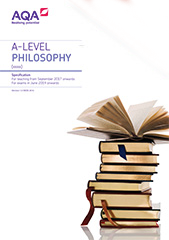3.4 Metaphysics of mind
What do we mean by ‘mind’?
Features of mental states:
- All or at least some mental states have phenomenal properties
- Some, but not all, philosophers use the term 'qualia' to refer to these properties, where 'qualia' are defined as 'intrinsic and non-intentional phenomenal properties that are introspectively accessible'
- All or at least some mental states have intentional properties (ie intentionality).
Dualist theories
Substance dualism
Minds exist and are not identical to bodies or to parts of bodies.
The indivisibility argument for substance dualism (Descartes).
Responses, including:
- the mental is divisible in some sense
- not everything thought of as physical is divisible.
The conceivability argument for substance dualism (expressed without reference to God) (Descartes).
Responses including:
- mind without body is not conceivable
- what is conceivable may not be metaphysically possible
- what is metaphysically possible tells us nothing about the actual world.
Property dualism
There are at least some mental properties that are neither reducible to nor supervenient upon physical properties.
The ‘philosophical zombies’ argument for property dualism (David Chalmers).
Responses including:
- a 'philosophical zombie'/a 'zombie' world is not conceivable
- what is conceivable may not be metaphysically possible
- what is metaphysically possible tells us nothing about the actual world.
The ‘knowledge/Mary’ argument for property dualism (Frank Jackson).
Responses including:
- Mary does not gain new propositional knowledge but does gain ability knowledge (the 'ability knowledge' response).
- Mary does not gain new propositional knowledge but does gain acquaintance knowledge (the ‘acquaintance knowledge’ response).
- Mary gains new propositional knowledge, but this is knowledge of physical facts that she already knew in a different way (the ‘New Knowledge / Old Fact’ response).
Issues
Issues facing dualism, including:
- The problem of other minds
- Responses including:
- the argument from analogy
- the existence of other minds is the best hypothesis.
- Dualism makes a "category mistake" (Gilbert Ryle)
Issues facing interactionist dualism, including:
- the conceptual interaction problem (as articulated by Elisabeth, Princess of Bohemia)
- the empirical interaction problem.
Issues facing epiphenomenalist dualism, including:
- the challenge posed by introspective self-knowledge
- the challenge posed by the phenomenology of our mental life (ie as involving causal connections, both psychological and psycho-physical)
- the challenge posed by natural selection/evolution.
Physicalist theories
Physicalism
Everything is physical or supervenes upon the physical (this includes properties, events, objects and any substance(s) that exist).
Philosophical behaviourism:
- 'Hard' behaviourism: all propositions about mental states can be reduced without loss of meaning to propositions that exclusively use the language of physics to talk about bodily states/movements (including Carl Hempel).
- 'Soft' behaviourism: propositions about mental states are propositions about behavioural dispositions (ie propositions that use ordinary language) (including Gilbert Ryle).
Issues including:
- dualist arguments applied to philosophical behaviourism
- the distinctness of mental states from behaviour (including Hilary Putnam's 'Super-Spartans' and perfect actors)
- issues defining mental states satisfactorily due to (a) circularity and (b) the multiple realisability of mental states in behaviour
- the asymmetry between self-knowledge and knowledge of other people’s mental states.
Mind-brain type identity theory
All mental states are identical to brain states (‘ontological’ reduction) although ‘mental state’ and ‘brain state’ are not synonymous (so not an ‘analytic’ reduction).
Issues including:
- dualist arguments applied to mind-brain type identity theory
- issues with providing the type identities (the multiple realisability of mental states).
Eliminative materialism
Some or all common-sense (“folk-psychological”) mental states/properties do not exist and our common-sense understanding is radically mistaken (as defended by Patricia Churchland and Paul Churchland).
Issues including:
- our certainty about the existence of our mental states takes priority over other considerations
- folk-psychology has good predictive and explanatory power (and so is the best hypothesis)
- the articulation of eliminative materialism as a theory is self-refuting.
Functionalism
Functionalism: all mental states can be characterised in terms of functional roles which can be multiply realised.
Issues, including:
- the possibility of a functional duplicate with different qualia (inverted qualia)
- the possibility of a functional duplicate with no mentality/qualia (Ned Block’s China thought experiment)
- the ‘knowledge’/Mary argument can be applied to functional facts (no amount of facts about function suffices to explain qualia).
Set texts
Avramides Anita (2001). Other Minds. Routledge, Chapter 2.
Block, Ned (1980) ‘Troubles with functionalism,’ in Readings in Philosophy of Psychology, Vol 1. Harvard University Press, 275–278 – section 1–2.
Chalmers, David (1996), The Conscious Mind: In Search of a Fundamental Theory. Oxford University Press, Chapter 1.
Chalmers, David (2003). ‘Consciousness and its place in nature’ in Blackwell Guide to the Philosophy of Mind, Sections 2 and 3. Blackwell
Churchland, Patricia Smith (2002). Brain-wise. Introduction (Sections 1, 3, 4) and Chapter 4, section 2. The MIT Press.
Churchland, Paul (1981), ‘Eliminative Materialism and Propositional Attitudes’, Journal of Philosophy 78, 67–90 (section 2, Why folk psychology might (really) be false)
Descartes, René (1641), Meditations on First Philosophy, 6
Hempel Carl (1949/2000), ‘The Logical Analysis of Psychology.’ in Richard Jeffrey (Ed) Carl G Hempel: Selected Philosophical Essays, Cambridge University Press
Jackson, Frank (1982), ‘Epiphenomenal Qualia’, Philosophical quarterly, 32, 127–136
Putnam, Hilary (1975/1986), ‘The Nature of Mental States’ In Mind, Language and Reality. Philosophical Papers, Volume 2. Cambridge: Cambridge University Press.
Ryle, Gilbert (1949/2000), The Concept of Mind, London, Penguin Classics, Chapters 1, 2, 5 and 6
Shapiro Lisa (Ed) (2007), The correspondence between Princess Elisabeth of Bohemia and Rene Descartes, edited and translated. University of Chicago Press. Letters from May 1643.
Smart, Jack J C (1959), ‘Sensations and brain processes’, The Philosophical Review, 68 (2), 141–156
